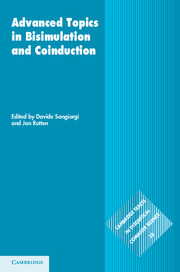Book contents
- Frontmatter
- Contents
- List of contributors
- Preface
- 1 Origins of bisimulation and coinduction
- 2 An introduction to (co)algebra and (co)induction
- 3 The algorithmics of bisimilarity
- 4 Bisimulation and logic
- 5 Howe's method for higher-order languages
- 6 Enhancements of the bisimulation proof method
- 7 Probabilistic bisimulation
Preface
Published online by Cambridge University Press: 05 November 2011
- Frontmatter
- Contents
- List of contributors
- Preface
- 1 Origins of bisimulation and coinduction
- 2 An introduction to (co)algebra and (co)induction
- 3 The algorithmics of bisimilarity
- 4 Bisimulation and logic
- 5 Howe's method for higher-order languages
- 6 Enhancements of the bisimulation proof method
- 7 Probabilistic bisimulation
Summary
This book is about bisimulation and coinduction. It is the companion book of the volume An Introduction to Bisimulation and Coinduction, by Davide Sangiorgi (Cambridge University Press, 2011), which deals with the basics of bisimulation and coinduction, with an emphasis on labelled transition systems, processes, and other notions from the theory of concurrency.
In the present volume, we have collected a number of chapters, by different authors, on several advanced topics in bisimulation and coinduction. These chapters either treat specific aspects of bisimulation and coinduction in great detail, including their history, algorithmics, enhanced proof methods and logic. Or they generalise the basic notions of bisimulation and coinduction to different or more general settings, such as coalgebra, higher-order languages and probabilistic systems. Below we briefly summarise the chapters in this volume.
The origins of bisimulation and coinduction, by Davide Sangiorgi
In this chapter, the origins of the notions of bisimulation and coinduction are traced back to different fields, notably computer science, modal logic, and set theory.
An introduction to (co)algebra and (co)induction, by Bart Jacobs and Jan Rutten
Here the notions of bisimulation and coinduction are explained in terms of coalgebras. These mathematical structures generalise all kinds of infinitedata structures and automata, including streams (infinite lists), deterministic and probabilistic automata, and labelled transition systems. Coalgebras are formally dual to algebras and it is this duality that is used to put both induction and coinduction into a common perspective.
- Type
- Chapter
- Information
- Advanced Topics in Bisimulation and Coinduction , pp. xi - xivPublisher: Cambridge University PressPrint publication year: 2011

